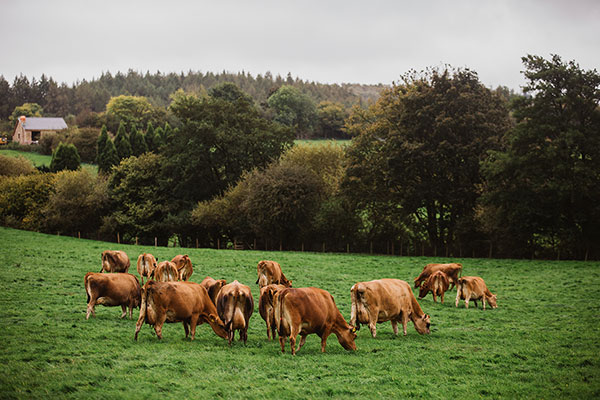The debate around the climate impact of farming has been reignited after the former chief scientist to Defra said half of the UK’s farmland should be rewilded to help tackle the climate crisis.
Sir Ian Boyd told the Guardian that restoring 50 per cent of farmland into woodlands and natural habitat could mean the amount of cattle and sheep would fall by 90 per cent. He estimated this would result in 20 per cent less food being produced, which could be replaced by developing vertical farms, he said.
The comments put him in direct opposition with the National Farmers Union, which has set out plans for agriculture in the UK to reach net zero carbon emissions by 2040 without reducing livestock numbers.
Instead, the NFU said precision techniques, greater efficiencies, production of plant fuel on farms, and feed additives for cattle, would help the sector reduce and offset its carbon.

Globally, agriculture is estimated to contribute around 13 per cent of carbon emissions and a series of peer-reviewed studies have recommended reducing intensively-produced meat and dairy intake as one of the best ways to reduce carbon footprints. The UK’s farming sector has fought to demonstrate that its largely grass-based livestock systems have a much lower footprint due to carbon storage potential and lower inputs.
Responding to Boyd’s comments on twitter, NFU president Minette Batters said: “It took two world wars to realise the error of not being able to produce enough food for our island nation. I said [at the Oxford Farming Conference] last year you only turn the food production tap off once. We cannot make the same mistake again.”
Another farmer, Joe Stanley, tweeted that: “Rewilding 50% of GB farmland will just offshore our food production to countries with [lower]️ environmental standards.”
The debate is likely to escalate further with news of Channel 4’s upcoming documentary, Apocalypse Cow, due to air on 8 January and fronted by George Monbiot, a leading proponent of rewilding, which he said would set out how farming as we know it could end within decades.
In a recent interview with Wicked Leeks, Monbiot said food losses caused by less production in the UK due to rewilding could be mitigated by developments in lab-grown and cultured proteins, for foods like palm oil and fish. “It could be the crucial technological change that allows us to stop both climate and ecological breakdown,” he said.















The comments on the impossibility of reducing livestock farming are not new. The argument for grass-fed cattle, lamb/mutton, and, maybe, outdoor-reared pigs is that uplands and scrublands are no good for arable, ergo they must be used for grazing. Up to a point Lord Cocker, but much of this land has been claimed for agriculture or rough grazing only in the last fifty or so years, certainly in my lifetime; before that it was fell or heath: there is nothing “traditional” about it. For the preservation of our fresh water supplies, clean air and flood mitigation, I believe we could and should at least halve our meat and milk production.
Many farmers in these “marginal land” areas struggle to make a living. Without government subsidy they would not be viable. The life is one of unremitting hard work, and increasing pressure to squeeze more and more meat from more and more difficult land. I feel that there should be an incentive for old, tired farmers to give up the slog and allow reafforestation/rewilding on their land in exchange for a decent, guaranteed pension and the right to stay in their home for their lifetime.
I advise anyone interested in this to read “Wilding” by Isabella Tree
From what I am aware, EU subsidies demand that land be kept from nature encroaching and subsidies are the reason the uplands have been stripped of their natural habitat. Maybe leaving the EU will stop this, but I doubt it. A lot of the uplands are in devolved Wales and Scotland and I should think farming has a powerful lobby to keep things the way they are. On a different point, where do the people who have turned vegan buy their clothing. I have not seen a plunge in sales for shops such as Primark. Clothing has a massive environmental impact but for some reason it does not seem to be attracting the same attention as meat or the same change in buying habits. Why are we so selective.
One of the biggest mistakes we continually make as a human race is to seek a one-size-fits-all, single, magic bullet to problems. If the many sides of the debate could come together and establish an ‘and’ rather than ‘or’ solution then we could get on with the solution rather than spend all this time and energy debating which one.
Love this very reasoned and rational approach – maybe peoples assemblies offer a way forward with cooperative decision making?
Yes, re-wilding and tree planting is the way to go. Much of the land in the UK is given over to feeding livestock, either through grazing or growing feedstuffs. There is grass everywhere you look and nothing for us grown to eat. The uplands are sheep-shagged bareness which support very little wildlife. Farmers are subsidised to rear loss making sheep, better to pay them to re-wild the land and do something to help nature and our planet, surely?
Animals agriculture is a dirty polluting business and for what? animals don’t make protein, they get it from plants and so can we and it is way better for us.. We must substantially reduce our animal farming to help reduce greenhouse gas emissions. Change to a plant based diet and cut out meat and dairy, is the single most effective thing people can do to reduce their carbon foot print..